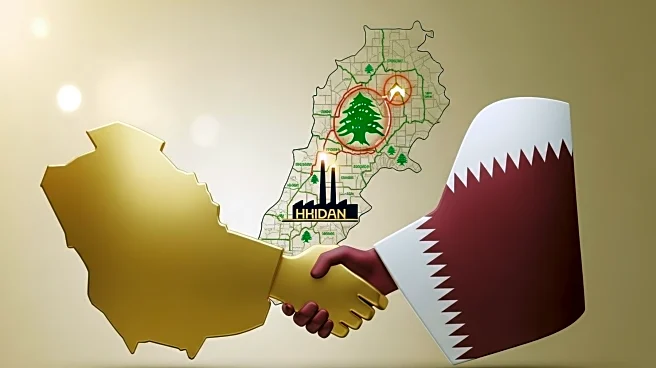What's Happening?
Saudi Arabia and Qatar are set to invest in an economic zone in southern Lebanon, near the border with Israel, aimed at creating jobs for Hezbollah members and supporters who disarm. This announcement was made by Tom Barrack, President Trump's envoy to the Middle East, following discussions with officials in Israel and Syria. The Lebanese government has decided to disarm Hezbollah by the end of the year, a plan that Hezbollah's leader has rejected. The U.S.-backed Lebanese army is preparing a disarmament plan, expected to be ready by the end of August, with government approval anticipated on September 2. Barrack emphasized the need for financial support from Gulf countries to aid the transition of Hezbollah members from military activities to civilian livelihoods.
Why It's Important?
The investment by Saudi Arabia and Qatar represents a significant shift in the geopolitical landscape of the Middle East, potentially reducing Hezbollah's military influence in Lebanon. This move could stabilize the region by decreasing tensions between Israel and Hezbollah, which have been ongoing since the conflict escalated in 2024. The economic zone aims to provide alternative livelihoods for Hezbollah members, reducing reliance on Iranian funding. This development could lead to improved relations between Lebanon and neighboring countries, fostering economic growth and regional cooperation. However, the success of this initiative depends on Hezbollah's willingness to disarm and integrate into civilian life.
What's Next?
The Lebanese government is expected to discuss and approve the army's disarmament plan on September 2. The U.S. is advocating for a one-year extension of the UN peacekeeping force, UNIFIL, in southern Lebanon, while focusing on strengthening the Lebanese army. The outcome of these discussions and the subsequent actions by Hezbollah will determine the future stability of the region. Continued diplomatic efforts by the U.S. and Gulf countries will be crucial in ensuring the successful implementation of the economic zone and the disarmament process.
Beyond the Headlines
The disarmament of Hezbollah and the establishment of an economic zone could have long-term implications for Lebanon's political and economic landscape. It may lead to a shift in power dynamics within Lebanon, reducing Iranian influence and increasing the role of Gulf countries in Lebanese affairs. This could also impact the broader Middle East, as regional powers reassess their alliances and strategies. The initiative raises ethical questions about the transition of militant groups to civilian roles and the responsibilities of international actors in facilitating such changes.









